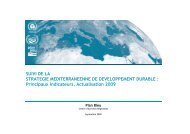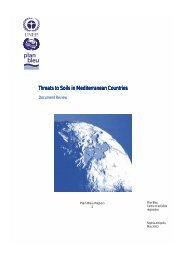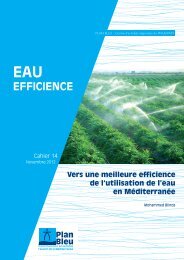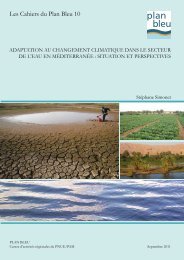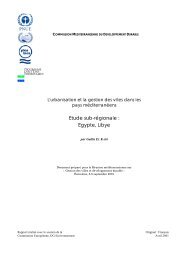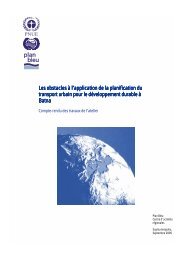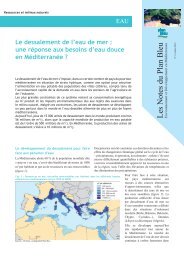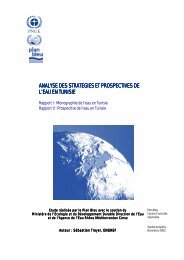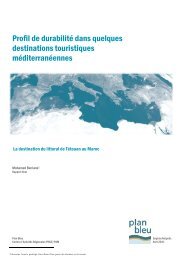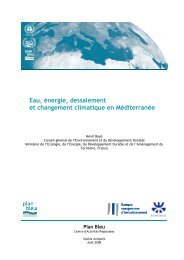Summary and Conclusions - Plan Bleu
Summary and Conclusions - Plan Bleu
Summary and Conclusions - Plan Bleu
You also want an ePaper? Increase the reach of your titles
YUMPU automatically turns print PDFs into web optimized ePapers that Google loves.
- Data: It forces choices to be made <strong>and</strong> allows priority data in terms of sustainable<br />
development to be identified. It can incite data producers to adapt their approaches<br />
<strong>and</strong> their collection <strong>and</strong> measurement systems;<br />
- Analysis: Indicators allow past trends to be measured, possible changes to be<br />
imagined <strong>and</strong> non-sustainable phenomena to be better appraised;<br />
- Assessment: Indicators help to set result-based goals <strong>and</strong>/or measure progress<br />
towards targets already set <strong>and</strong> distance to goals (performance indicators);<br />
- Reporting: Indicators make reports on the environment more objective <strong>and</strong><br />
enriched <strong>and</strong> thus constitute a favoured vehicle for communication. Their use<br />
guarantees comparability of reports over time.<br />
The activity on indicators is also a process for mobilising the several observatory<br />
partners <strong>and</strong> consolidating their mutual relationships for the benefit of both sides. By<br />
enhancing the already produced data <strong>and</strong> by transforming them into new information,<br />
indicators can bring a technical contribution to sustainable development issues in the<br />
frame of sectoral partnerships (e.g. agriculture/environment).<br />
In conclusion:<br />
• Indicators make up one of the main observatory’s activities <strong>and</strong> should be developed<br />
in every country;<br />
• The activity on indicators is to be developed in a harmonised context, in accordance<br />
with the decisions of the Contracting Parties (adoption of the common core set of<br />
Mediterranean indicators in application of the MCSD recommendations).<br />
4. Working with Partners for Gathering Environment <strong>and</strong> Development<br />
Data<br />
Environment <strong>and</strong> Development Observatories should not replace data producers. On the<br />
contrary, they shall establish dynamic relationships with the main data producers. For<br />
doing so, it is important:<br />
• To associate the main partners with the observatory activities FROM THE OUTSET;<br />
later, this association can be strengthened <strong>and</strong> widened to other partners by setting<br />
up Steering committees;<br />
• To convince them of the usefulness of the added value which will be brought to that<br />
data;<br />
• To make them aware of their responsibilities without trying to dispossess them or to<br />
replace them in part of their work (which can raise the issue of data quality control);<br />
• Sometimes, to provide them with financial (or material) incentives to produce data;<br />
• Not to under-estimate the time required for data gathering or the skills needed for<br />
dialoguing with producers. It may be useful to delegate these tasks to thematic<br />
specialists.<br />
It should be stressed that the institutional strengthening of exchanges with data<br />
producers (agreements, legal framework) is essential, even if this can be by-passed at the<br />
outset by relying on informal networking.<br />
5. Information Systems <strong>and</strong> Databases<br />
Practical lessons drawn from various experiences show that no st<strong>and</strong>ard information<br />
systems can exist without taking into account contexts <strong>and</strong> changes in priorities over<br />
5



